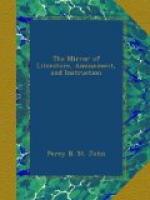Can any thing be more full of pathos? Those few words say all that can be said or sought: the dead had had enough of life; all they wanted was rest, and this they implore! There is all the helplessness, and humble hope, and death-like prayer, that can arise from the grave—’implora pace’[2] I hope whoever may survive me, and shall see me put in the foreigners’ burying-ground at the Lido, within the fortress by the Adriatic, will see those two words, and no more put over me. I trust they won’t think of ’pickling and bringing me home to Clod or Blunderbuss Hall.’ I am sure my bones would not rest in an English grave, or my clay mix with the earth of that country. I believe the thought would drive me mad on my death-bed, could I suppose that any of my friends would be base enough to convey my carcass back to your soil.—I would not even feed your worms, if I could help it.
“So, as Shakspeare says of Mowbray, the banished Duke of Norfolk, who died at Venice, (see Richard II.) that he, after fighting
Against black Pagans, Turks, and Saracens,
And toil’d with works of war, retired
himself
To Italy, and there, at Venice,
gave
His body to that pleasant country’s
earth,
And his pure soul unto his captain, Christ,
Under whose colours he had fought so long.
“Before I left Venice, I had returned to you your late, and Mr. Hobhouse’s, sheets of Juan. Don’t wait for further answers from me, but address yours to Venice, as usual. I know nothing of my own movements; I may return there in a few days, or not for some time. All this depends on circumstances. I left Mr. Hoppner very well. My daughter Allegra was well too, and is growing pretty; her hair is growing darker, and her eyes are blue. Her temper and her ways, Mr. Hoppner says, are like mine, as well as her features; she will make, in that case, a manageable young lady.
“I have never heard anything of Ada, the little Electra of my Mycenae. * * * But there will come a day of reckoning, even if I should not live to see it. I have at least, seen ------ shivered, who was one of my assassins. When that man was doing his worst to uproot my whole family, tree, branch, and blossoms—when, after taking my retainer, he went over to them—when he was bringing desolation on my hearth, and destruction on my household gods—did he think that, in less than three years, a natural event—a severe domestic, but an expected and common calamity—would lay his carcass in a cross-road, or stamp his name in a Verdict of Lunacy! Did he (who in his sexagenary * * *) reflect or consider what my feeling must have been, when wife, and child, and sister, and name, and fame, and country, were to be my sacrifice on his legal altar—and this at a moment when my health was declining, my fortune embarrassed, and my mind had been shaken by many kinds of disappointment—while I was yet young, and might have reformed what might be wrong in my conduct, and retrieved what was perplexing in my affairs! But he is in his grave, and * * * What a long letter I have scribbled!”




